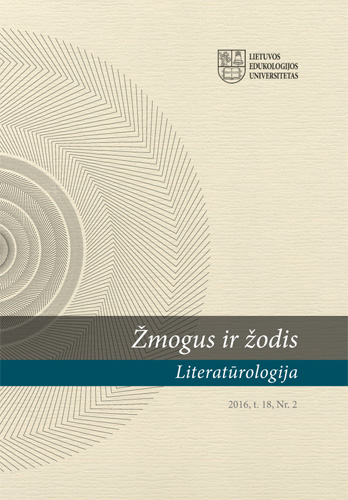Latviai „Dievų miške“. „Dievų miškas“ Latvijoje
Latvians in the “The Forest of the Gods” and “The Forest of the Gods” in Latvia
Author(s): Vigmantas ButkusSubject(s): Latvian Literature, Baltic Languages, Cultural Anthropology / Ethnology
Published by: Vytauto Didžiojo Universitetas
Keywords: Balys Sruoga; “The Forest of the Gods,” Latvians; imagoanthropological image; reception;
Summary/Abstract: A memoir, Dievų miškas (The Forest of the Gods), by the Lithuanian writer Balys Sruoga (1896-1947) written in 1945, after the author returned to Lithuania from Stutthof concentration camp, depicts various national, sociocultural, professional and other groups of people and portrays typical, outstanding or memorable representatives of the afore-mentioned groups. Among other things, the author writes about the community of Latvians, which was large and diverse at the concentration camp, as well as its individual members, named and unnamed. The first part of the article deals with an imagoanthropological image of the Latvian community and explores its most important features, subjective or objective. The article attempts to answer how these characteristics are related to particular Latvians; what personalities are concealed but can be easily identified and what intentions, subtexts and contexts of such characterization or lack of them are present in the text. For instance: 1) how are the death and funeral of a famous Latvian academic and political activist, Konstantīns Čakste (1901-1945), described and why and 2) how, despite not being mentioned directly, is Čakste’s comrade, the famous Latvian politician Bruno Kalniņš (1899-1990), related to The Forest of the Gods? The second part of the article analyses the extent and the nature of information available to Latvian readers about The Forest of the Gods and its translation into Latvian (Dievu mežs, translated by Harijs Gāliņš). It shows that the Latvian translation published in 1968, follows the Russian translation and omits a sentence that generalizes the imagoanthropological image of the Latvians in the book, even though it may be perceived as slightly rude. The article also explores what the former prisoners of Stutthof concentration camp living in Latvia in 1968 1969 and onwards, thought about Sruoga’s book and the image of Latvians in it and what relation to the novel they had.
Journal: Žmogus ir žodis
- Issue Year: 18/2016
- Issue No: 2
- Page Range: 22-44
- Page Count: 23
- Language: Lithuanian

